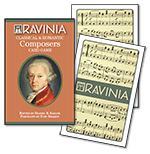Mozart Magic: Ravinia Festival
Symphony No. 31 in D Major, K. 297 (300a) (“Paris”)
Concerto for Three Pianos in F Major, K. 242 (“Lodron”)
Concerto for Two Pianos in E-flat Major, K. 365 (316a)
Symphony No. 35 in D Major, K. 385 (“Haffner”)
At Ravinia Festival, Highland Park
Having been generally disappointed by the CSO’s recent track-record in the music of Mozart, I headed for the Ravinia Festival on Sunday night to see how the orchestra would fare in an all-Mozart program conducted by festival director James Conlon and featuring, among others, revered pianist Leon Fleisher as a draw. I was impressed from the start, the ebullient first movement of the opening “Paris” Symphony, one of the more popular of Mozart’s middle-period symphonies; the orchestral playing was polished and precise yet also elegant, lively, and, above all, musical – and I have come to not take such a combination for granted when this orchestra performs Mozart! And for once the reduced ensemble did not sound smaller than it looked – a function of the smaller stage at Ravinia? This music can take a bit more drama than Conlon elicited, particularly in the boisterous finale, but a more stereotypically “classical” approach is certainly appropriate in much of Mozart, and overall I was satisfied with Conlon’s highly stylish conducting.
If anything, the orchestral playing grew even more pointed and lively in the Concerto for Three Pianos, an earlier work which, like so much of Mozart’s earlier output, is disarming in its inspired combination of craftsmanship and charm; if anything, the slow movement is even lovelier than that in the later Paris Symphony, although the finale, written in the tempo of a minuet, is somewhat underwhelming and low-energy for a Mozart finale. The team of soloists consisted of Leon Fleisher, his less-famous wife Katherine Jacobson Fleisher, and Israeli pianist Alon Goldstein. It was not long ago that Leon Fleisher triumphantly recovered from a muscular-neurological ailment, focal dystonia, that had immobilized his right hand, but for whatever reason the now 85-year-old pianist was not out to dazzle, leaving the dominant first and second piano parts to his wife Mr. Goldstein and taking for himself the much simpler, mainly accompaniment-esque third piano part – Mozart, in fact, had written this part for a child of eleven who was apparently not the prodigy he had been. Be that as it may, the performance was marked from all corners by a natural grace and musicality than never descended (as can all too easily occur in Mozart concertos) into daintiness. Perhaps one could have asked for a little more personality from the first two pianists at times, but it was a sympathetic and committed performance. The same applied to the rendition of the Concerto for Two Pianos, again featuring Mr. Goldstein and Ms. Jacobson Fleisher – a later work by Mozart in the same refreshing spirit as the triple concerto.
(Following the triple concerto, Mr. Fleisher offered as an encore a left-hand arrangement, by Stephen Prutsman, of Jerome Kern’s “All the Things You Are,” dispatched with a flair and confidence that surely provided some compensation for anyone who had expected or hoped to hear a more prominent contribution from him in the concerto.)
The final piece on the program, as well as probably the most beloved, was the Haffner Symphony, the last of Mozart’s lauded final six symphonic masterpieces. It is in many ways a lighter work than the five that followed it, with fewer varying emotions explored, even if it in many ways matches them in craftsmanship and fluency of musical ideas. The exuberant first movement with its dashing string runs tends to be played in a single burst of energy as a straight-ahead orchestral showpiece; Conlon’s interpretation here was more subdued and nuanced in ways that did not entirely convince me, with clipped phrase-endings and occasional mannerisms in dynamics diminishing the sense of joyous sweep that can be evoked here. But the CSO’s playing throughout the symphony was lovely, and it brought to a satisfying conclusion a concert that restored my faith in the ability of the CSO to give a convincing Mozart performance. If only the orchestra can reduplicate that back at Orchestra Hall! If given conducting as sympathetic as James Conlon often provided Sunday evening, I have every hope that it can.
Recommended.
Samuel Wigutow
Date Reviewed: July 289, 2013

